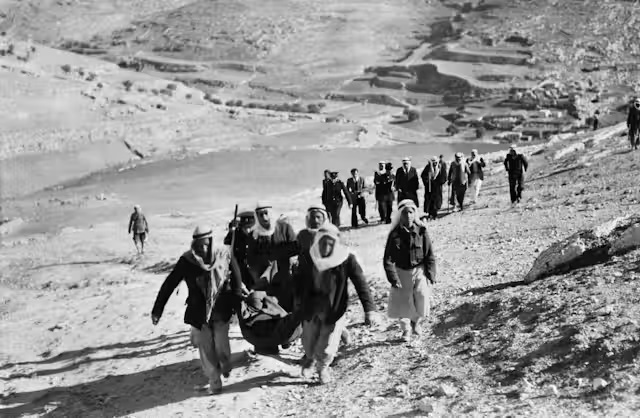- Web
- Feb 20, 2026
Nakba: Reflecting on 76 years since the Palestinian exodus
-

- Web Desk
- May 15, 2024

JERUSALEM: The “Nakba” summarises one of the most defining chapters in Palestinian history and refers to the events that unfolded during the 1948 Palestine war when more than 700,000 Palestinians were violently displaced from their homes.
The tragedy marked the beginning of a genocide and displacement that continues to this very day.
Read more: Israeli tanks push deeper into Rafah, battles rage in northern Gaza
The roots of the Nakba can be traced back to the late 19th century with the arrival of Zionists in Ottoman Palestine. Driven by the vision of creating a Jewish state, Zionist settlers sought to establish a homeland for the Jewish people, often at the expense of the indigenous Palestinian population.
The British Mandate period worsened tensions further since the British government endorsed Zionist views through initiatives like the Balfour Declaration. Meanwhile, the British Empire was also neglecting the rights of the Palestinians.
The situation escalated in the aftermath of World War II and the Holocaust, as international sympathy for Jewish refugees fueled support for the establishment of a Jewish state in Palestine. By 1947, even the United Nations proposed a partition that would divide Palestine into separate Jewish and Arab states.
The partition was bitterly opposed by the Palestinians that viewed it as a huge violation of their rights and sovereignty. The rejection of the partition plan by Palestinian leaders and the Arab League led to further conflict,
In early 1948, hostilities erupted and this led to a series of violent confrontations between Zionist paramilitary groups and Palestinian communities. Widespread atrocities were committed against Palestinian civilians, including massacres, forced expulsions, and the destruction of villages.
The state of Israel was declared by May 1948. Armies from several Arab countries intervened in support of Palestinian. However, they were brutally defeated in the Six Day war.
The Arab intervention was not only unable to prevent the establishment of Israel or protect Palestinians, it resulted forcible expulsion of hundreds of thousands of Palestinians in the ensuing months.
The Palestinians began refugees in their own land.
The Nakba led to over 500 Palestinian villages disappearing off the map of the earth. It completely devastated Palestinian society and culture. Entire communities were displaced, losing their homes, compelled to seek refuge elsewhere.
Despite the passage of time, the Nakba remains a lingering unresolved issue. While Palestinians commemorate it as a symbol of their resilience, the Israeli narrative often portrays the events of 1948 as a war of independence, minimising the suffering and displacement of Palestinians.
Read more: International concerns mount as Israel escalates violence in eastern Rafah
The legacy of the Nakba continues to be seen today, fueling ongoing conflict. The Palestinians were denied the right of return to their ancestral homes.
Even 76 years later, 35,000 Palestinians have lost their lives in the latest escalation of the decades-long conflict. This one-sided war has tragically claimed the lives of over 14,000 Palestinian children.




